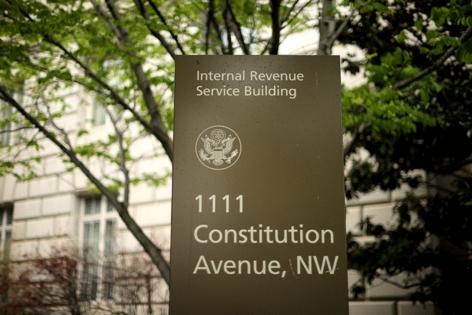What is the Johnson Amendment? What to know as IRS changes tax exemptions
Published in News & Features
A longstanding tax exemption preventing nonprofit organizations from engaging in political campaign activity that favors individual candidates has been reinterpreted — signaling that religious organizations may now be excluded from the rule.
The decades-old Johnson Amendment does not apply to speech by houses of worship to its congregation through “customary channels of communication,” the IRS said in a July 7 court filing in the U.S. District Court for the Eastern District of Texas.
The filing is an effort to resolve an August lawsuit against the IRS in which religious groups, including the National Religious Broadcasters, Intercessors for America and two Texas churches, take aim at the Johnson Amendment, stating that not being able to endorse a candidate is a violation of their First Amendment rights.
McClatchy News reached out to the IRS on Tuesday but did not receive an immediate response. The National Religious Broadcasters told McClatchy News it is awaiting the judge’s decision on the filing before publicly commenting.
What is the Johnson Amendment?
In 1954, Congress approved an amendment by Sen. Lyndon Johnson that banned nonprofit organizations from engaging in political campaign activity on behalf of individual candidates.
Although, according to the amendment, 501(c)(3) nonprofits are unable to endorse political candidates, they are not excluded from all political activity. A limited amount of lobbying and advocacy is allowed as well as nonpartisan voter registration and education, according to guidance from the IRS.
Aside from a few cases, the tax rule has rarely been enforced against houses of worship that have a “special case” because of the First Amendment, according to experts.
In 2017, President Donald Trump vowed to repeal the Johnson Amendment and issued an executive order that said the Department of Treasury wouldn’t take action against religious organizations for speaking about political issues from a religious perspective.
What does the reinterpretation mean?
While the IRS’s reinterpretation indicates leniency on the Johnson Amendment for religious organizations, some experts cautioned against overinterpreting the document.
Edward Zelinsky, professor at the Benjamin N. Cardozo School of Law, who specializes in tax law, told McClatchy News the document technically only reaches the plaintiffs in the lawsuit.
“It is a compromise in a district court in Texas that will have as a legal matter no presidential basis. This is not a federal judge writing an opinion,” Zelinsky said.
Roger Colinvaux, a professor at the Columbus School of Law, whose expertise is in tax law for nonprofits, agreed and said religious organizations should be cautious with the filing because the language leaves room for uncertainty.
“Nowhere in this consent judgment does the IRS use the word endorse, so it’s really not clear from the terms of this exactly how the law is changing, or what the IRS’s new interpretation of the law is,” Colinvaux told McClatchy News.
While the filing signals an invitation for houses of worship to endorse candidates — seeing that it’s unlikely the Trump administration will enforce the tax rule in those spaces — there’s still a risk of losing their tax-exempt status as long as the IRS doesn’t have any binding guidance, he said.
Additionally, if a future administration has a different approach to the amendment, it could retroactively go after a church that it views as having overstepped the Johnson Amendment so long as the action is within a three-year statute of limitations, Colinvaux said.
Many experts, including Zelinsky and Colinvaux, said they see this filing as more symbolic than as something that changes a law and compared it to the 2017 executive order under the Trump administration.
“This new interpretation by the Trump administration — which he advocated in 2017 — is more of a sop to his conservative religious base which has been clamoring for this for years,” Steven Green, professor at the Willamette University College of Law, told McClatchy News in a Tuesday email. “It’s simply more blurring of the line between church and state.”
Since being elected to a second term in January, the Trump administration has made a series of moves to “bring religion back,” including reviving the White House Faith Office and establishing a Religious Liberty Commission.
Why does it matter?
Some critics worry this filing might turn houses of worship into tools for political campaigns.
“Now that the Trump administration has opened the door to pastors and houses of worship explicitly backing candidates for office, all bets are off,” Fish Stark, executive director of the American Humanist Association, said in a statement. “There will be little to stop billionaires from funneling money through churches to buy our elections.”
Others, like Miranda Perry Fleischer, a nonprofit law and tax law professor at the University of San Diego School of Law, said they believe it will make it more difficult for houses of worship that want to stay neutral about political candidates.
While religious organizations and other nonprofits have always been involved in politics by speaking about the values they have, endorsing specific candidates crosses a line between political advocacy and political intervention, Fleischer told McClatchy News.
She said this new interpretation may also encourage other nonprofits to “push the boundaries” of the Johnson Amendment.
“Why should only people whose desire to change the world is motivated by religion be allowed to have their nonprofit be involved in politics?” Fleischer said.
Although the filing seems to open the door for houses of worship to endorse political candidates without compromising their tax-exempt status, experts are still looking out for clearer guidance from the IRS for any concrete change to take place in churches across the country.
________
©2025 The Charlotte Observer. Visit charlotteobserver.com. Distributed by Tribune Content Agency, LLC.







Comments